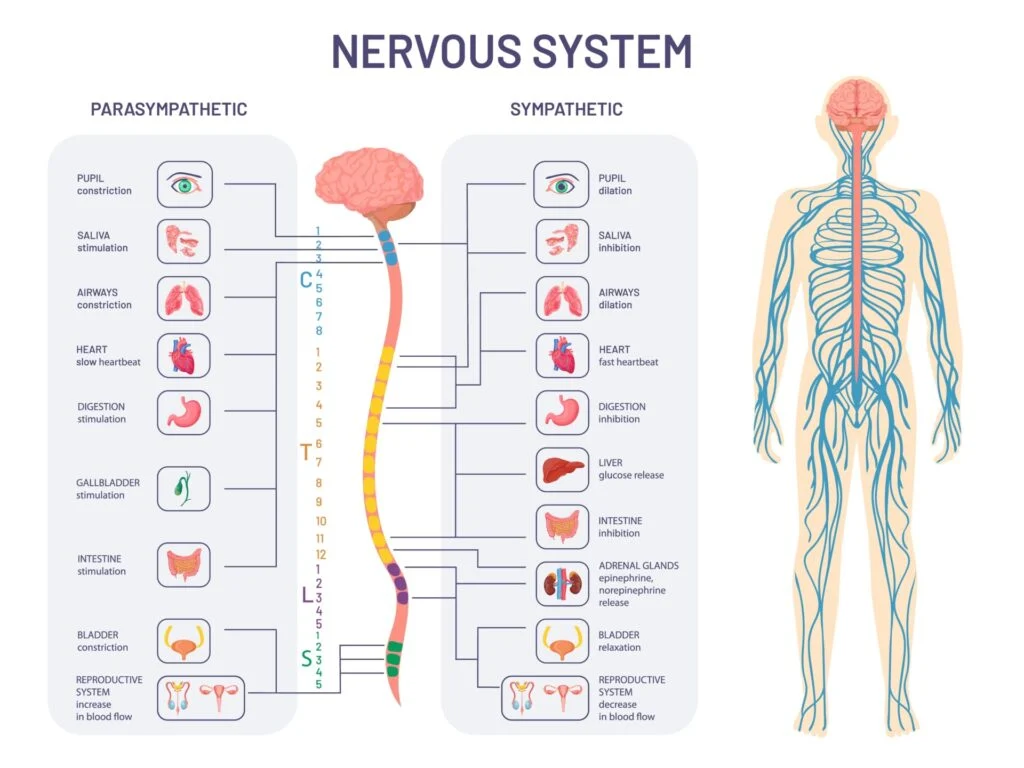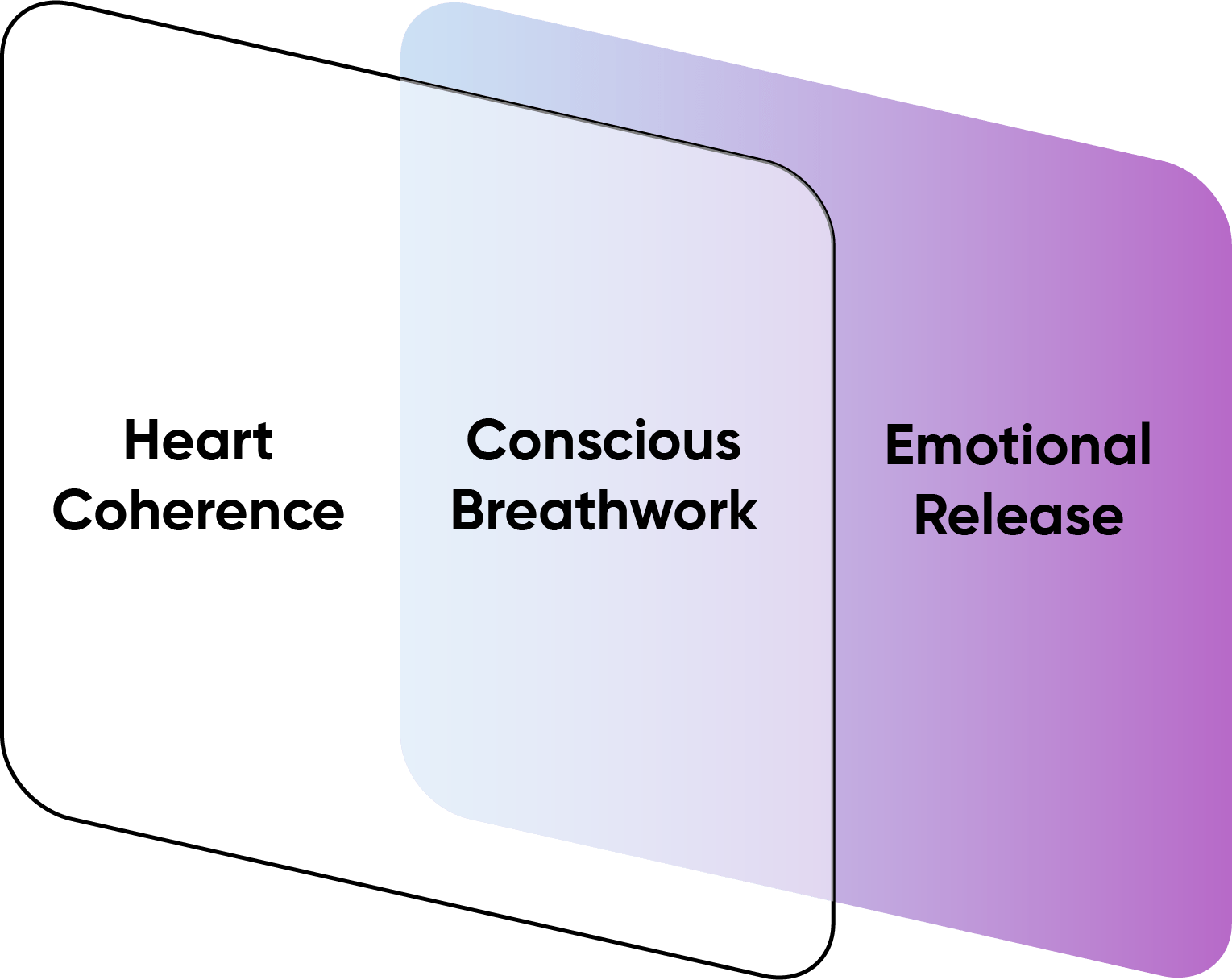If you’ve found yourself landing on this article, it’s probably because you or someone you know has been curious about the benefits of breathwork; however, maybe you or they have been a bit skeptical. Does breathwork work?
Yes, it absolutely does, and because of the advancement of modern-day science, we are now beginning to understand the physiological benefits proven to support mental clarity and emotional resilience in the most natural forms.
This article delves into the transformative power of breathwork, exploring its scientifically backed benefits, such as regulating the autonomic nervous system, improving heart health through increased heart rate variability, and strengthening emotional resilience.
We also provide practical advice on integrating breathwork into your daily routine and discuss the variability of its effectiveness among individuals. Whether you’re new to breathwork or seeking to deepen your practice, this guide illuminates the path to harnessing the profound impact of breathwork on overall health and well-being.
Breathwork is an active practice of intentionally manipulating the breath through various techniques and patterns, which we will share later in this article. This type of conscious breathing stimulates the body’s natural ability to self-soothe and self-regulate, tied to the autonomic nervous system, which is a key component to managing stress.
When done consistently and safely, it enables the body to restore energy and release stress – naturally. Over time, the body can repair and build a new template to better manage stress daily that has lasting effects on cardiovascular health and overall vitality.
What is also interesting to note is that Breathwork has ancient roots deeply embedded in various spiritual, religious, and healing traditions dating back 6000 years.
While specific practices and beliefs vary, many ancient cultures recognized the profound connection between breath, mind, body, and spirit. What we love about breathwork is how it unites every human being, including all backgrounds and beliefs, with one common truth. Breath = life.
When it comes to managing stress and promoting relaxation, how does breathing tie into nervous system health? Breath is closely connected to the ANS, which is a crucial part of our physiology and oversees our body’s automatic functions, such as heart rate and digestion, and is divided into two branches: the sympathetic and the parasympathetic nervous systems.
The former prepares the body for action, while the latter helps the body rest. Breathwork techniques can modulate the activity of these branches, leading to various physiological and psychological effects.

Sympathetic Nervous System (SNS): Activation/Fight/Flight
Parasympathetic Nervous System (PNS): Rest/Recovery/Homeostasis
Using both functions of the nervous system enables the body to shift from a state of stress to calm easily and with more flexibility, which, over time, builds resilience, a key skill in mastering stress and performance.
In research, participants practicing regular breathwork exercises reported notable stress reduction.
Another study measuring physiological responses to stress before and after breathwork training found a significant decrease in sympathetic nervous system activity.
This data suggests a positive answer to the question, “How Does breathwork work?” By engaging in breathwork, individuals may unlock their whole human potential for self-regulation, leading to a tranquil state that permeates their daily lives.
Breathwork connects us to the internal knowing that our body has the innate ability to self-heal and find balance.
Breathwork goes beyond just a moment of calm; it extends its benefits to one of the most vital organs in our body: the heart.
Heart rate variability (HRV), a measure of the variation in time between each heartbeat, indicates cardiac health and the balance within the autonomic nervous system. Engaging in breathwork has positively impacted HRV, suggesting a stronger, more resilient heart.
Facilitators of breathwork here at Higher Energy utilize heart-coherence bio-feedback technology by Heart Math as a tool for enhancing HRV, which in turn can contribute to better heart health.
By consciously controlling the breath, one can potentially steer the heart towards a rhythm that is not only healthier but also indicative of a more resilient and adaptable cardiovascular system. With each breath taken with intention, we open up the possibility of a healthier heart that beats with life and vitality.
Emotional resilience is our ability to bounce back from stress or adversity, and it’s a critical aspect of our overall well-being. Breathwork can be a key player in enhancing this resilience. By learning to manage our breath, we can influence our emotional state, helping us to remain balanced in the face of life’s challenges.
These techniques serve as tools for individuals to cope with emotional upheaval. They provide a sense of agency over one’s emotional responses and can be particularly beneficial in moments of acute stress or when dealing with traumatic events.
Individuals and teams who have worked with us 1:1 at Higher Energy report a greater sense of peace and emotional steadiness with regular breathwork practices.
Take, for example, our client, Rob M. Rob, is a safety director based out of the US who has, in the past, struggled with severe digestion issues due to stress, which led him to spend time in the emergency year after year.
Rob’s wife and mother are fighting cancer, and the stress of family, finances and health are weighing on him. Here is his testimony after completing our three-month 1:1 breathwork coaching program with our master trainer and facilitator, Kindra Fox.

“In the past year, I sought guidance to enhance my breathwork practice. Experimenting with short-breath exercises for anxiety control had some benefits, but I felt something was missing.
Joining Kindra’s breathwork program proved transformative. Kindra’s coaching and guidance introduced me to conscious breathwork, helping me release emotions and enhance energy regulation.
I am happy to know now what coherence feels like in my life. I am able to regulate my daily energy better and keep my anxiety and stress levels in check. I am able to get and stay centred in a different way than I have ever experienced, and I can now feel more connected to my family and friends in a new way.”
We’re so honored and grateful to work closely with individuals looking to unlock their whole human potential by learning to self-heal and awaken to their highest potential.
When it comes to the additional benefits of breathing, a study of 14,000 participants conducted by the Heart Math Institute who practiced regular breathing techniques such as coherence breathing paired with positive emotions such as gratitude, care, compassion and love enhanced sleep +36%, emotional vitality +27%, calm +49% as well as decreased depression -67%, fatigue -53%, and anger -67%.
The science and stories behind breathwork’s impact on emotional resilience are compelling. Not only does it offer an accessible way to manage emotions, but it also equips individuals with a non-pharmacological method to support their mental health.
The practice of breathwork, with its deep roots in ancient traditions and its wings in modern science, stands out as a promising ally in the journey toward emotional resilience and psychological well-being.
Incorporating breathwork into daily life doesn’t require a significant time investment or special equipment. With a few simple techniques, anyone can begin to experience the benefits of breathwork. Here’s how to make breathwork a regular part of your wellness routine.
These practices can be done anywhere, anytime. Starting or ending your day with breathwork or using it as a break during stressful moments can significantly enhance your overall quality of life.
Integrating breathwork into your routine is a step toward better physical health, improved mental clarity, and emotional stability. The adaptability of breathwork makes it a versatile tool that can be tailored to fit the needs and schedules of individuals from all walks of life.

While breathwork is universally accessible and offers numerous benefits, its effects can vary from person to person. Understanding how to gauge its impact on your health and well-being is crucial for integrating breathwork effectively into your life.
Recognizing that breathwork is not a one-size-fits-all solution is essential. It’s about finding what works best for you and adapting practices to meet your needs. If you are curious about what breathwork can do for you or where to start, feel free to book complementary breathwork consult with us to explore if breathwork is right for you.
Assessing the effectiveness of breathwork in your life involves both introspection and observation. It’s a personal journey that unfolds differently for everyone; going at your own pace and rhythm is important. With each breath you take, you build a more conscious awareness of yourself and those around you.
Breathwork’s true value lies in its practice over time. While immediate effects can be felt, the lasting impact on well-being, emotional resilience, and physical health emerges through consistent and mindful practice.
Whether you’re seeking to reduce stress, improve heart health, or build emotional resilience, breathwork offers a path to greater well-being that is both ancient and newly relevant in our fast-paced world.
In answering the question, “Does Breathwork Work?” it’s clear that the practice holds the key to unlocking whole-human potential for many. However, the journey is deeply personal, and the results are as varied as those who embark on the path of breath awareness and control.
To learn more or speak to a certified breathwork instructor, visit us and learn more at www.higherenergy.ca. Feel free to sign up for our monthly newsletter and be invited to upcoming events.
Keep breathing.
Want to get first access to our future free breathwork events, audios & content? Join our exclusive club list and get first access!
Educating and empowering you to master stress, maximize energy, and achieve balance at home, work + beyond.
Share your name + email to sign up for upcoming workshop.